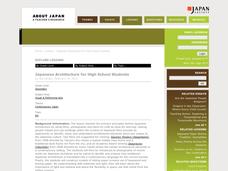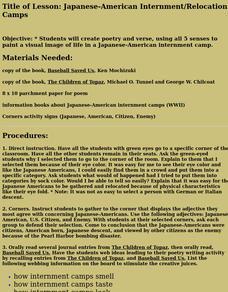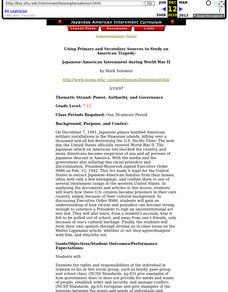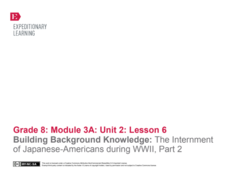Curated OER
Feudal Japan
An excellent overview of historical Japanese culture, this presentation could carry through a world history unit or a lesson on the history of Japan. Especially interesting are the slides that compare Japanese armor and castles to other...
Incredible Art Department
Notan Collages - "Expanding the Square"
Notan is a Japanese word that expresses the interaction between light and dark. Learners explore Notan while creating dimensional art pieces that examine positive and negative spaces. They'll discuss the art of Notan, create...
Curated OER
Famous Person: Yushiko Uchida
Third, fourth, and fifth graders read the book The Bracelet by Yushiko Uchida and examine the events of Uchida's life. They participate in a guided discussion of Japanese culture, perform a reader's...
Curated OER
Asian Art
Art from early China, Korea, and Japan is historically significant. Present these stunning images to your class, while you explain art movements that define traditional Chinese, Korean, and Japanese time periods and culture. Note: This...
Japan Society
The “I” Novels in the Context of Early 20th-Century Japan
Although this lesson plan covers the rather obscure topic of the Japanese "I-novel", it also includes a great deal of historical information and material for an in-depth discussion of universal literary concepts. Specifically, young...
Curated OER
Koi Pond
Create this beautiful koi pond scene using watercolor paper, crayons, and paints. This would be a fantastic project to link to a scientific study of pond life or a historical study of Japanese culture.
Curated OER
America and the Sino-Japanese Conflict, 1933-1939
Students examine the U.S. stance regarding the Sino-Japanese conflict. In this diplomacy lesson, students analyze the sanctions employed by United States on Japan when they took over Manchuria. Students determine how actions...
Cleveland Museum of Art
Japanese Folktales (Asian Odyssey)
The Cleveland Museum of Art presents this interdisciplinary model unit that asks class members to explore how the same themes are presented in the folktales and art of several cultures.
Japan Society
Japanese Architecture for High School Students
Japanese architecture is rich in symbolism and culture. Critical thinkers engage in three activities intended to expose them to the beauty of Japan. They read through the book, Praise of Shadows by Junichiro Tanizaki and watch the...
Japan Society
The Russo-Japanese War, 1904-1905: A Turning Point in Japanese History, World History, and How War is Conveyed to the Public
The big question: How did Russo-Japanese War imagery and the press influence Japanese perception of the war? Learners consider this big question as they compare and contrast various artistic media from the period. The lesson is...
Asian Art Museum
Japanese Architecture for Elementary School Students
Art and architecture go hand-in-hand. Kids watch clips from the Hayo Miyazaki film Spirited Away to better understand Japanese customs and architecture. The discussion questions included are very good, and will help you lead the class in...
Curated OER
Feudal Powers in Japan
A traditional textbook chapter focuses on feudal powers in Japan, and includes vocabulary, note-taking tips in the sidebar, main ideas, and follow-up assessment questions. It also incorporates opportunities for art...
Curated OER
Modernization in Japan: Japan followed the model of Western powers by industrializing and expanding its foreign influence.
Showcase the effects of modernization of Japan. This is a well-put-together resource, great for taking notes, and providing clear information. The class learns about open trade with Japan, the Meiji Era, the Sino-Japanese War, and...
Japan Society
Changing Times, Changing Styles: New Japanese Literary Styles of the Late Nineteenth Century
Focusing on Doppo's "Unforgettable People" and late nineteenth century Japanese literature, this resource also leads to discussions of form being dictated by content. Explore the development of new literary styles first-hand by...
PBS
Exploring Selected Haiku by Issa
If your class doesn't know what a haiku is, show them two examples from the Japanese poet Issa (both included here), and have them make some observations. How long are they? What is the structure? A video and a list of questions help...
Curated OER
Japanese Poetry: Tanka? You're Welcome!
Students analyze Japanese tanka poetry. In this Japanese poetry lesson, students identify analyze the structure of tanka poetry. Students complete the activities at the given links for the lesson and compose two tanka poems.
Curated OER
Japanese-American Internment/Relocation Camps
Students create poetry and verse, using all 5 senses to paint a visual image of life in a Japanese-American internment camp.
Curated OER
Japanese-American Internment during World War II
Students write an in-class essay on whether they agree/disagree with Lippmann's article concerning Japanese-American internment
Curated OER
Japanese Internment During World War II
Learners identify, describe and discuss the reasons why Japanese-Americans were placed in internment camps and what life was like at these camps. Then they write an unsent letter to a family member on the East Coast describing their...
Fairbanks North Star Borough School District
Eric Carle Mural
Inspire first grade artists to learn about abstract and realistic art while reading Eric Carle's Where are you Going? To See My Friend. Young artists design and make a mural collage by tearing shapes of paper while comparing English and...
Wikipedia
Map of World War II Japanese American Internment Camps
Your learners may be surprised to view the extensive number of Japanese American Internment Camps that existed in the United States during World War II. This map details the area along the Pacific Coast from which people of Japanese...
EngageNY
Building Background Knowledge: The Internment of Japanese-Americans during WWII, Part 4
Learners use a Analyzing Mediums handout to detail the advantages and disadvantages of communicating with mediums such as artwork, photographs, and political cartoons in the Japanese-American Internment during World War II primary...
EngageNY
Building Background Knowledge: The Internment of Japanese-Americans during WWII, Part 3
Check those sources carefully. Scholars learn to analyze and critique primary sources with the work they completed in the previous activity. Learners compare and contrast sources that agree and disagree about Japanese-American internment...
EngageNY
Building Background Knowledge: The Internment of Japanese-Americans during WWII, Part 2
Scholars learn about primary sources with a Primary Sources: Japanese-American Internment during World War II packet. Pupils work with a partner to read challenging sources in the packet while making notes in the margins. They then...
Other popular searches
- Japanese Film
- Japanese Art and Music
- Japanese Culture
- Japanese Internment
- Japanese Art
- Japanese Internment Camps
- Japanese Folk Tales
- Japanese Literature
- Japanese Cooking
- Japanese Calligraphy
- Japanese Poetry
- Japanese Americans

























